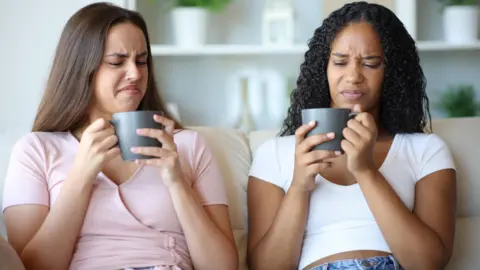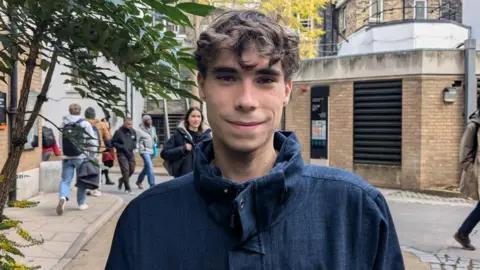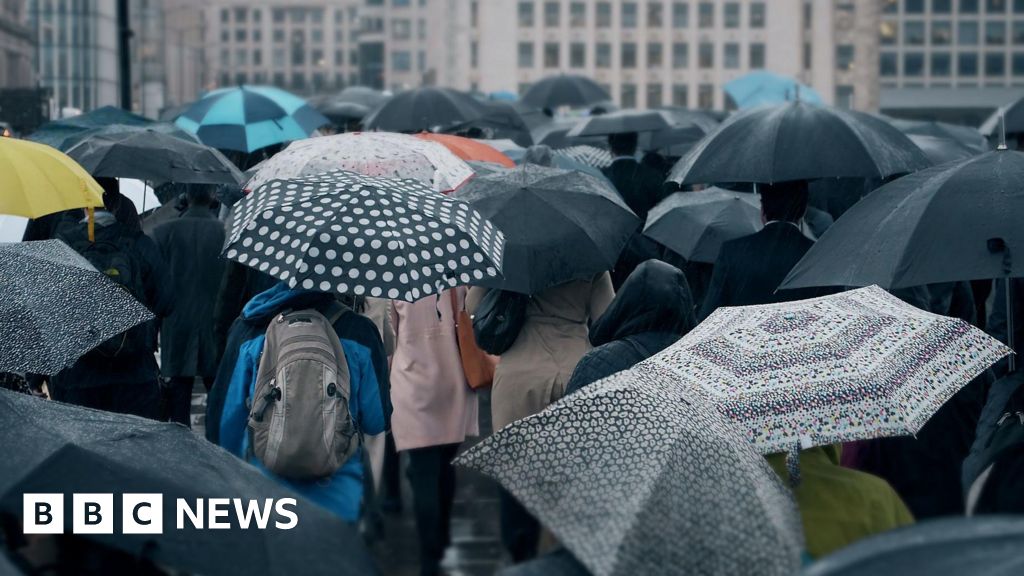
 Getty Images
Getty Images
It’s that quintessential British tradition that we have been enjoying for hundreds of years.
The answer to every crisis, a bonding ritual when you welcome someone into your home and the first drink many people wake up to.
“Fancy a cuppa?” or even simply “Tea?” is music to your ears, right?
Well, maybe not for everyone.
"I suppose there's kind of an association with tea as an old person's drink," says Gillie Owen, aged 20.
The student from London says he and his friends prefer water or diet soda drinks.


Gillie thinks of tea as "an old person's drink"
Layba, meanwhile, doesn't drink tea at all.
"I have never liked tea," the 20-year-old says. "I just think it tastes really off, like, really weird.”
It's a stark contrast to her parents who, she says, “really love" tea.
So is it a generational thing? As a nation, are we falling out of love with tea?
'Iced tea and healthy drinks'
Last week, one of Britain’s oldest tea firms, Typhoo Tea, collapsed after a drop in sales.
The 120-year-old company has been rescued by vape maker Supreme, whose boss says he wants to develop new products under the brand.
Sandy Chadha told the BBC the tea market was in decline but said Supreme would look to appeal to the younger generation who preferred "things like iced tea and healthier drinks".
Tea sales volumes have fallen by 4.3% compared with two years ago, according to analysts at NielsenIQ.
And a recent survey by Mintel suggested less than half the nation, 48%, now drink tea at least once a day.
Kiti Soininen, food and drink researcher at Mintel, says traditional tea is facing “intense competition” from fruit, herbal, green and specialty black tea.


Dylan prefers less traditional teas like Redbush
Twenty-one-year-old student Dylan says he drinks tea, but not the usual builder's tea - black with a smidge of milk – and prefers to go caffeine free.
"I drink less tea than my parents definitely. I drink Redbush tea and other less ‘tea’ teas," he says.
Shayma, 18, says she also prefers herbal tea, while most of her friends drink coffee. She says there are "so many drinks now” and she hasn’t even heard of Typhoo.
Changing landscape
Ms Soininen points to the huge difference between sales of tea and coffee.
“Sales of ordinary tea stood at £377m in 2023, leaving it far behind instant coffee, at [almost] £1bn,” she says.
Even instant coffee's popularity is being challenged by the fast-growing ready-to-drink coffee market, she adds, which has seen sales more than double over the last five years.
Polina Jones from NielsenIQ says while people "are not falling out of love with tea per se", the landscape is changing with huge offerings from bubble tea, herbal teas, kombuchas and energy drinks attracting the younger generation.
If this trend continues, she believes brands should reinvent themselves and figure out how to get into the ready-to-drink space. Twinings, for example, has started to offer canned sparkling tea, while bottled kombuchas appeal to students and young professionals buying a meal deal, she says.
Supreme’s purchase of Typhoo includes two herbal tea brands, Heath & Heather and the London Fruit & Herb Company, as well as specialty tea brand Ridgeways. Analyst Susannah Streeter from Hargreaves Lansdown believes Supreme will incorporate these into wellness brands it already owns.
Breakfast tea, not afternoon
Another challenge for black tea is that even for those for whom it is a staple, costs are rising and so they are buying in smaller volumes.
In 1974, the average family purchased 68g - about 30 tea bags - of tea per person, per week. By 2023, that had gone down to 19g - about 10 tea bags – per person, according to government figures.
"What's particularly telling of the potential long-term threat for black tea is that while all age groups have similarly high usage of tea in the early morning and with breakfast, younger groups are much less likely than older ones to reach for the drink later in the day," says Mintel’s Kiti Soininen.
She concludes with a stark warning for traditional tea makers – if younger generations continue with these habits as they get older, this will ultimately “chip away” at the size of the market.
And as one BBC reader commented on the Typhoo collapse story: "You know things are bad when a tea company in the UK goes bust.”

 By BBC (Business) | Created at 2024-12-08 08:24:41 | Updated at 2024-12-22 18:33:35
2 weeks ago
By BBC (Business) | Created at 2024-12-08 08:24:41 | Updated at 2024-12-22 18:33:35
2 weeks ago






